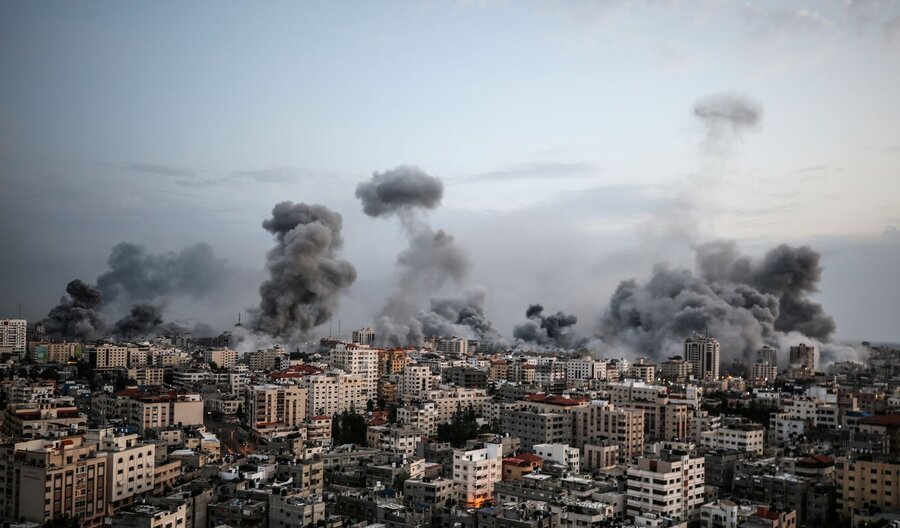The relentless violence in Gaza continues to claim innocent lives, destroying homes, hospitals, and hopes for a peaceful future. The harrowing images of civilian casualties, particularly among women and children, have shocked the conscience of the world. As global leaders voice their concerns, Pakistan has emerged as a vocal advocate for the Palestinian people, urging immediate international intervention to halt the bloodshed.
France’s Foreign Minister Jean-Noel Barrot recently called on Israel and Hezbollah to seize a “window of opportunity” for a ceasefire. This diplomatic appeal aligns with Pakistan’s long-standing commitment to justice, human rights, and peace in the Middle East. Islamabad recognizes that achieving a sustainable peace requires not just halting violence but addressing the underlying causes of the conflict.
The humanitarian crisis in Gaza is unparalleled. Weeks of intense bombing and blockades have devastated the region’s infrastructure, leaving millions of Palestinians without access to food, water, or medical supplies. Hospitals are overwhelmed, operating without electricity or essential resources, as they struggle to treat the mounting number of casualties. Civilians, particularly children, are bearing the brunt of the conflict. The United Nations has reported alarming levels of displacement, with hundreds of thousands forced to flee their homes. Schools, shelters, and community centers have become targets, undermining the sanctity of civilian spaces during armed conflict.
Pakistan has consistently stood with Palestine, reaffirming its support for the Palestinian people’s right to self-determination and condemning Israel’s illegal occupation. Islamabad views the Palestinian struggle not just as a regional issue but as a moral imperative tied to the principles of justice, equality, and international law.
Prime Minister Anwaar-ul-Haq Kakar has reiterated Pakistan’s commitment to advocating for a two-state solution, with East Jerusalem as the capital of a sovereign Palestinian state. This stance is rooted in Pakistan’s belief that lasting peace can only be achieved through dialogue, mutual respect, and adherence to international legal frameworks. Beyond diplomatic rhetoric, Pakistan has actively engaged with international forums to highlight the plight of Palestinians. At the United Nations, Pakistani representatives have called for immediate ceasefires, accountability for war crimes, and unrestricted humanitarian access to Gaza. The government has also mobilized resources to provide humanitarian aid, emphasizing the need for collective global efforts to alleviate suffering.
France’s call for a ceasefire is a timely and commendable step, but achieving lasting peace requires more than appeals. Global powers, particularly those with significant influence in the region, must take decisive actions to halt the violence and ensure accountability for human rights violations.
The United States, the European Union, and other influential actors must leverage their diplomatic and economic influence to press Israel for an immediate ceasefire. This includes lifting the blockade on Gaza to allow the delivery of essential humanitarian aid. International institutions like the United Nations and the Organization of Islamic Cooperation (OIC) must also play a proactive role. The UN Security Council must adopt a unified stance, prioritizing the protection of civilians and the enforcement of international humanitarian law. Meanwhile, the OIC must intensify its diplomatic efforts to unify Muslim-majority nations in support of the Palestinian cause.
The Gaza conflict is not an isolated crisis; it has significant regional and global implications. In Lebanon, the escalating tensions between Israel and Hezbollah risk sparking a broader conflict that could destabilize the Middle East. Pakistan has highlighted the need for a comprehensive approach that addresses these interconnected challenges while prioritizing immediate humanitarian relief.
Pakistan’s call for global action resonates with the sentiments expressed by leaders like Jean-Noel Barrot, who emphasized the urgency of a ceasefire. Islamabad views this as an opportunity to unite the international community in pursuit of a just and lasting peace. Global solidarity must extend beyond statements of condemnation to tangible actions that address the root causes of the conflict. This includes holding Israel accountable for its actions, ensuring reparations for the victims, and fostering an environment conducive to dialogue and reconciliation. The Gaza crisis is a stark reminder of the international community’s collective failure to uphold the principles of justice and human rights. However, it also presents an opportunity to rectify these failures through decisive and united action.
As Pakistan continues to advocate for Palestine, it calls on global powers, regional actors, and international institutions to rise to the occasion. The world must seize this moment to halt the violence, provide humanitarian relief, and pave the way for a just and lasting peace. Only through collective efforts can we hope to end the suffering and build a future founded on justice, dignity, and hope for the Palestinian people.

